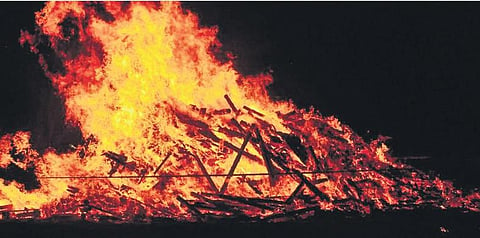

Between February 2 and 7, 1992, the funeral of a certain Ka De Nongsiang was ritually performed in the village of Nongshyrkon, in West Khasi Hills, Meghalaya. Known as ‘Ka Phor Sohrat’, this particular funeral ceremony was possibly the last of its kind to be performed—the conversion of many Khasis to Christianity, with the accompanying drifting away from the indigenous Niam Khasi religion, meant that even back then, nearly 30 years ago, the highly ritualistic, complex, and expensive ‘Ka Phor Sohrat’ was seen as being no longer feasible.
If something as deeply imbued with meaning as last rites could die out, what hope might there be for the other, less spiritual aspects of culture? If the folklore that ties us to the land, and the myths that live, even in our language and in the names of our villages, waterfalls, rivers and hills, should disappear, would we even realise what we had lost? Would our dances, our songs, the games and sports we play, not suffer as well?
Kynpham Sing Nongkynrih uses a funeral, similar to that ‘Ka Phor Sohrat’ of 1992, as the fictional basis of his thousand-page novel, Funeral Nights. The narrator of this work is a 40-year old man, a writer and academician, aptly named Ap Jutang (‘keeper of the covenant’). When he and some of his friends hear of a ‘Ka Phor Sohrat’ due to be held in Nongshyrkon, the last there ever will be, they decide to travel there to see it. Eleven people—10 men and one woman—nearly all of them well-educated and urban, travel the long, dusty way deep into the forests, only to realise that they have arrived a few days too early.
Ap Jutang and his friends stay on in Nongshyrkon for the few days before the funeral will begin: they are well looked after, in a comfortable shelter built specially for them, their meals provided for, and rice beer aplenty. Naturally, they start conversations: about deforestation, corruption, politics, the influx of non-Khasis into Meghalaya.
They soon settle into a routine, coming together every evening to talk. Ap and Bah Kynsai, one of the senior members of the group, are among the most articulate and knowledgeable when it comes to explaining the history, the origin, myths, the legends and stories of the Khasis; but each of them, from
the hot-headed ‘Ning’ to the often inebriated but eager Raji, has their own stories to offer. There are anecdotes of pranksters and alcoholics; of shamans, archers, politicians. There are chilling stories of bizarre deaths and equally bizarre lives. There is magic, myth, humour, despair. The insecurity of a people losing touch with their land and their roots.
Funeral Nights, while ostensibly a novel, is not a book so easily classified. Very little actually happens in this book; the overwhelming bulk of it consists of the conversations, the stories, legends, and more. The depth and breadth of Kynpham Sing Nongkynrih’s research come through brilliantly, making this not just a poignant and sensitively written book about the Khasis, but a very informative one as well. And yet, Nongkynrih’s primary characters do not glorify Khasis: there is a rootedness, an acceptance of idiosyncrasies (as in the penchant for English-sounding names), a humour that takes the good with the bad.
I began this book with trepidation—1,000 pages seemed daunting. But the way this book reads, it did not feel weighty and tedious. It was more like sitting down with old friends and listening to conversations. Amusing, enlightening, witty conversations that opened my eyes, made me think. In an India where insularity and the othering of people not perceived as ‘mainstream’ is rife, Funeral Nights is the sort of book that should be made required reading. We need many more books like this, insightful and well-written, opening a window on the often-ignored corners of India.